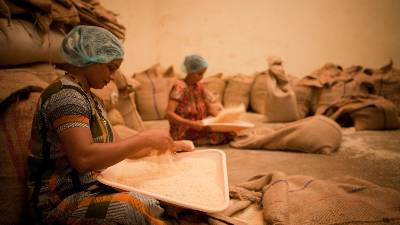No women’s work, no food on your plate
On International Workers’ Day, we look at women’s work, both paid and unpaid, and their role in our current food system.
In all regions of the world, in both urban and rural contexts, women and girls take up an immense proportion of unpaid care work. Simply put, Bangladesh, India, Nepal and Pakistan, where women in rural areas can spend between 8 and 10 hours every day on unpaid care work. In South Africa, almost three quarters of the value of household production is done by women. In Argentina, women take up in average twice as much household work than men. What about Europe? In countries like Portugal, women spend at least 5 hours daily on similar activities – men only 1.5 hours.
This includes household tasks like buying food, cooking, cleaning and taking care of children, the elderly and sick. This type of work is still unrecognized and undervalued, even though the economy and our societies would not function without it.
This is also true for our food systems and food work. In other words, who produces, cooks, buys and shares, distributes and disposes our food, and how. So… if women stopped their food work today, what would be on your plate tomorrow?
Despite all this, women continue to be disproportionally affected by hunger and malnutrition – and their roles in food systems rendered invisible. Our economic food system exploits women and benefits from the free or lowly paid care work that we do, from the low wages and precarious conditions of work.
The first step towards overcoming this is to start in our own homes. We must make visible the unpaid, unrecognized social reproductive work of women. We must reflect on – and change – the assumptions and values we assign to women’s roles and work in society. And we can challenge the ways that patriarchy and the neoliberal capitalist food system negatively impacts both women and nature, and press for the right to food for all.
Women are at the forefront of the struggle for a society without exploitation, mobilizing, organizing, and exercising their autonomy worldwide, through both quiet daily resistance and organized social movements.
When it is more urgent than ever to reimagine food, environment and economies – let us turn to women for answers.
